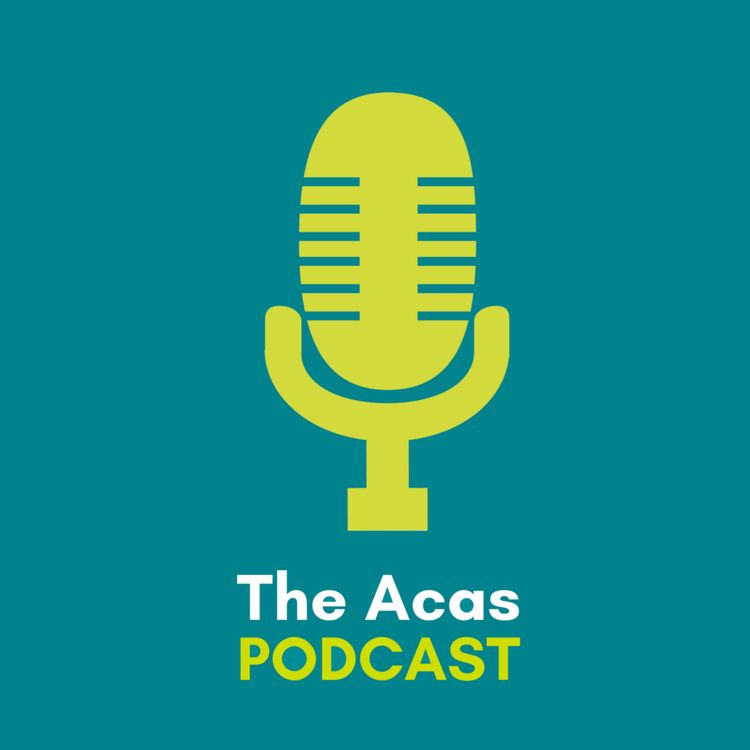Share

The Acas Podcast
Brendan Barber on conflict, coronavirus and being Acas Chair
In his last week as Acas Chair, Sir Brendan Barber shares his insights from behind the scenes. We find out how he successfully helped resolve the junior doctors dispute, plus his tips on handling conflict, why listening matters and the key issues for working life after the coronavirus pandemic.
Plus: what it is really like to be a knight.
Episode resources:
Acas Policy Paper: Brendan Barber on Building Back: making working lives better after the Coronavirus pandemic.
Acas Policy Paper: Managing workplace conflict: the changing role of HR
Collective conciliation (resolving disputes between groups of employees and employers): https://www.acas.org.uk/collective-conciliation
Early conciliation (resolving disputes between individuals and employers): https://www.acas.org.uk/early-conciliation
Transcript
Sarah Guthrie 0:00
Welcome to the Acas Podcast. I'm Sarah Guthrie , part of the communications team here at Acas and today I'm joined by Brendan Barber, who's been Chair of Acas for the last six years and steps down at the end of July. I'm also joined by Shumon Ali-Rahman, who heads up our media team, joining me today to grill Brandon on his time at Acas and everything he's learned. So Brendan, you've been Chair of Acas for six years and before that, you'll be most known for your role as General Secretary of the TUC. I was wondering, what's been your proudest achievement during your years as Acas Chair?
Brendan Barber 0:33
I guessed you were going to ask me that. In terms of personal things, dispute resolution is something that you get a buzz if you have been able to help play a positive role in helping to resolve particular big disputes where the dynamics of the way you've handled something might have made a real difference and you can kind of sense that. So some of the particular disputes that I've kind of played a part in - the junior doctors, British Airways one relatively recently with the pilots, the universities dispute a while back - some of those I got personally involved in, if they do move forward in a positive way, then those are things that give particular satisfaction.
Shumon Ali-Rahman 1:24
So, the junior doctors dispute, probably one of the most high profile disputes since I've been here at Acas anyway, it was top news story. I still, still record coverage at 1280 pieces of media covering back in 2016 in my head. You led the conciliation team for this dispute. It was considered unsolvable and yet you managed to get a deal. How did you do it?
Brendan 1:49
I knew some of the leading figures in the BMA, the doctors union that was in dispute. As the dispute unfolded, I kind of made an approach initially to the BMA to try and get a feel for what the key issues were from their perspective. I did know some people on the government side, also talked to them about it and felt my way towards, you know, reaching a point where potentially both sides might be willing to talk and could see value in perhaps Acas holding the ring. There'd been a lot of distrust on both sides in some of the earlier exchanges in the earlier stages of the dispute. And sometimes that's what the third party can do - create a different kind of arena to try and work through what the issues are and what the differences are. Sometimes in disputes, the sides aren't very good at listening to each other. They're not very good at listening to actually understand what the real positions are with the people on the other side of the table. And again, sometimes a third party can help explain things in ways that the side then actually listens and understands better, perhaps what the other side's perspective isn't on.
Shumon 3:05
Conciliation is obviously one of Acas' top services that we provide. But what would you say, what kind of personality attributes do you think it's almost like essential in that kind of role? And what would your tips be?
Brendan 3:19
Well, you've got to try and leave your ego outside the room. Sometimes you're dealing with very strong personalities, with strongly held views about the issues. And sometimes you're dealing with delicate egos that feel their own status is at stake. You have to be able to engage in a way that helps build trust in you, but certainly leave your ego outside the room. So if one side asserts very strongly A, B or C, there are times when you have to say, well, that's rubbish. But certainly you need to earn the right to say that by being able to absorb people's feelings as well as, as well as what they're actually saying about the issue.
Shumon 4:00
I was curious if we're talking about junior doctors, yeah, was there any kind of time within when you were dealing with because it went on for quite a while when you think, Oh my god, this is never going to be solved.
Brendan 4:12
I never thought that. There were certainly times and other disputes where you find it very difficult. And you read some real impasse points. And what I've learned is you do have to be prepared to stick out it and take the knockbacks and keep working on things and keeping the relationships on both sides in a state of good repair so that even if immediately you're not able to resume the process, as and when there may be a thought about a different idea or a different approach, you've still got the credibility and goodwill on both sides to be able to bring them back together, perhaps at a later point.
Sarah 4:51
So leaving your ego at the door, listening, absorbing the emotions. These aren't simple skills. And I'm wondering, were you always a natural at this or is it something that grew?
Brendan 5:01
It's something that's definitely grown. I did a lot of dispute resolution work at the TUC. And as you kind of gather experience, you get a little bit more confidence obviously. And you realise that at the end of the world if an idea doesn't fly, that's fine. Again, that's where you leave your ego outside, you don't worry about being knocked back. If something's not gonna work, but other kinds of things I learned to both the TUC and Acas experience is writing skills very, very important in conciliation and dispute resolution. Because even if you think you've got an understanding of an issue, of a solution to a problem, unless you can write it down, so that it's clear, it's on the record, and you can confirm with both sides, this is what we're agreeing, then it's so easy for things to just dissipate once people leave the room and "That was, that wasn't exactly what I meant. That wasn't exactly what I said." So the ability to craft the words, find the language is an important kind of skill. And I learned through my time at the TUC, particularly actually, during my time as the kind of TUC press officer, I was given the opportunity to sit in on a lot of big dispute meetings and develop the craft of writing the press release. So what are we saying about this meeting at the end of it, if there's a, you know, at that time, a lot of disputes with a lot of journalistic media interest, and so on. People outside wanting the statement, what's happened, and so on. Through trial and error, I kind of developed some skills of actually trying to craft the conclusions, find the language - that's a very important skill in conciliation, not just about the dynamics in the meeting, you've got to be able to nail it down and find the language to nail it down.
Sarah 6:57
And are those skills that you just mentioned relevant to everyday working life? Not many of us find ourselves in headline hitting disputes on a daily basis.
Brendan 7:06
Yes, absolutely. I mean, conflict is a part of working life, isn't it? Whether it's about individuals falling out, working relationships, you know, deteriorating, and all these kind of issues about listening skills to really understand what somebody's saying is the cause of their grievance or concern through to trying to deal with issues empathetically, trying to build trust that you're not going to go out and rat on them. Building the trust is about demonstrating you can observe confidentiality, manage the communication in a thoughtful, intelligent, respectful way that's not going to drop somebody in it. You have to recognise as well the lead negotiators on whichever side are sometimes playing an extraordinarily difficult role trying to keep their side together. I've seen in many disputes to where there are big fractures on the management side or the trade union side, with hawks and doves on either side. On the union side, sometimes of sense of people who may not really want to get the solution they want, they want to pursue the battle further and others perhaps keen to get the solution. On the management side, doves who want to get a settlement and reach a compromise, rebuild relationship, and hawks who are saying, "Well, we want to beat the union up, you know, we need to teach them lesson." So you have to understand the dynamics and the difficult challenges facing lead negotiators either side of the dispute.
Sarah 8:50
Hmm. So these complex skills of listening, empathy, building trust are all really important for all of us because conflict shows up in work and you can actually see also playing out within each party's workplace and grouping in a dispute. So panning out a bit, coronavirus is having a dramatic impact on the country and we're likely to head into a recession. Lots of people are talking about how it's likely to change the way that we work. What do you think are going to be the key issues going forward that we should pay attention to?
Brendan 9:21
For me, there are lots of issues that arise but just to mention two or three, there's been a lot of commentary about in the crisis, who we see as important that perhaps ought to be valued in different ways. Now a lot of commentary about that amongst the lowest paid workers in the British economy are the people who are working the care sector. Is that the right value for all of those people working in that sector. So issues around equality and inequality have come to the fore that have been highlighted by the Black Lives Matter movement, have been highlighted by the metoo to movement. So there's been a lot of lip service paid over a long period to the issues around equality and inequality. But as we're thinking about a new economy, in the wake of the crisis, if we get a vaccine and so on, we don't want to just go back to the old normal, we want to create something new and something different, something more positive. I think about the issue of well being and mental health, again, perhaps a lot more attention just in the last year or two has been paid to that. We're going to see real increases in mental health problems, the number of young people who are potentially going to really struggle to get a decent start in the labour market, we know from history, they can be particularly vulnerable in the context of the deep recession. So they're issues in that space too that I think are going to need a lot of really serious thought and attention. And the other kind of issue I'd headline is, if there are going to be big changes, if a lot of firms are going to be thinking, we need to restructure, we need to change our business model, we need to rejig the whole way people work, how are they going to manage that change? Are they going to really work hard to engage with the workforce, to bring their people with them on that journey of change? Are they going to be genuinely open and transparent? Are they going to actually really listen to the priorities and concerns of that workforce? Or are they just gonna kind of pay lip service to that and bang through profound changes that might have a huge impact on the lives and living standards of their workforce without any genuine consultations? So equality, inequality, health, mental health in particular and wellbeing? Is there going to be a real process of engagement? These are going to be big, big challenges.
Shumon 12:03
We've seen a lot of interest in the media about the challenges for businesses in this new climate. What do you think the challenges are for trade unions? What's going to happen in the future? I mean, there's talk of recession, there's talk about massive redundancies, etc. How do you think unions can effectively navigate in the new future?
Brendan 12:20
Well, there's gonna be a tough period for many unions. They may see membership hit if unemployment rises to the kind of levels that commentators are speculating about. But the broader challenge, I guess, strategically for unions, is in this context, whether they can really secure the opportunities to be able to exert the influence that they arguably should have. And that's both at the level of individual company and organisations and employers and in terms of our national discourse. Can they be brought into the process in a constructive way, so that the views are genuinely taken into account? I mean, my impression was that in designing some of the emergency responses to the crisis, the TUC along with the CBI and others were listened to. That was very important. Well, we're going to need more specific interventions in the labour market over the next period, I suspect. How those measures are actually designed, both the TuC and the CBI really ought to be a big part of the discussion because they're the people who have to make it work in practice. We go way back to the 80s and so on. There were periods where the quality of some of the training interventions was just seen to be inadequate. And they, they lost credibility as opportunities for young people. Making sure that you design things in ways that have proper quality guarantees, and you safeguard against the possible negative consequences of interventions, those are things where the CPI, the TuC will have really important insights that I would hope that the Governmemt will want to bring, bring into the conversation.
Sarah 14:26
And these are really big issues that we're talking about. If I were to give you a magic wand to get all workplaces to do one thing, what do you think would make the biggest difference?
Brendan 14:36
I think it will be about listening and engaging. I mean, there are some places that do this very well and they get the benefits. Lots and lots don't fall into that category. Given that we're facing a period of probably big, big, big, big change in so many places, key to handling that well and positively will be the extent to which employers find the right mechanism for engaging, and genuinely listen to their workforce. I mean, we just all know this in our everyday life, don't we? When things are handled well, in your own workplace in your own personal life, people feel better about things and engage more positively with things, and so on. When things are really badly handled, they retreat, withdraw, they, they have lots of negative feelings. Listening, I can't overstate the importance. And sometimes you see people that have exceptionally good listening skills. And sometimes you just see people just wanting to move on to the next kind of thing coming out of their own mouth. I know which I think is rather more effective.
Sarah 15:44
So moving on without listening to you [laughter]
Shumon 15:48
I've got one final question. So you are Sir Brendan Barber and I have this vision of all the knights meeting up every single year around a round table? [laughter] But what is it like being a knight?
Brendan 16:03
It's not the most important thing that I think about when I wake up in the morning. [laughter] When you become a knight, you get a letter from an organisation that is an organisation for Knights for which quite a reasonable fee was being asked for wanting to join this organisation? The only benefit I could see was that you could marry your daughter in the crypt of some notable chapel somewhere. [laughter] which I never thought was something Felicity had ever particularly ever wanted to take up.
So it's a form of recognition isn't it? And in the trade union world, I found that there were always different feelings about it, the whole kind of idea about honours, some people, always rather negative about the idea for anybody from my background. I was always more positive than that and thought, you know, if in British society we're giving recognition to people who contributed in all these other different ways, why should you say they don't want to be a part of that? Trade union representatives give a real huge commitment, many on a voluntary basis, to try and make their workplaces better, their communities better, and should be able to be recognised for that as people have a different kind of contribution. So that was always my, my view. But I totally respect some people take a different view.
Sarah 17:41
Well, on that very respectful note, demonstrating your ability there to see two sides of an argument, Brendan, thank you so much for sharing your insight on how you handled these high profile disputes, on the challenges of workplaces rebuilding after COVID and how important listening is in all of that. Thank you. This has been the Acas Podcast. If you'd like to get the latest episodes, then do feel free to like and subscribe review on podcast apps. We're on Apple podcasts, Spotify, most major Android apps, and you can find more information on conciliation on our website. We'll put some useful links in the session notes for this episode too. Thanks for listening.
More episodes
View all episodes

How employee voice improves engagement
16:53|In the latest episode of the Acas podcast, we talk to Susan Reilly and Emma Hughes from the Phoenix Group about setting up an employee forum.They tell us why this method of hearing employee voice works for them, and how it has supported the organisation through change.The conversation also covers:How employee forum relationships differ from HR and trade unionsForum structureWhat the forum coversForum governanceHost:Terry Duffy - Strategic Lead, Growth Partnership, AcasGuests:Susan Reilly - Head of Phoenix Employee Representation ForumEmma Hughes - Communication and Engagement Consultant, Phoenix Employee Representation ForumFor more information about staff forums please visit our advice page: Using workplace forums to discuss important matters at work.
Informal conversations – the key to reducing workplace conflict?
19:42|In this episode of the Acas Podcast, Terry Duffy (Strategic Lead, Acas) sits down with Professor Richard Saundry (Principle Research Fellow, University of Westminster) to discuss the benefits of upskilling line manages and giving them the confidence to address conflict at the earliest possible stage with an informal conversation.This is a must listen for anyone with line management responsibilities, HR practitioners and anyone with an interest in good workplace relations. Further reading: Acas blog: Skilled Managers Productive Workplaces - Translating research into workplace practice that worksTraining: Conflict management skills online course
Understanding neurodiversity in the workplace
32:41|In this episode of the Acas Podcast, we’re joined by guest speakers, Professor Almuth McDowall, Professor of Organisational Psychology at Birkbeck University, and Jodie Hill, Managing Partner and founder of Thrive Law, for a deep dive discussion on neurodiversity in the workplace. The conversation covers: · What does it mean to be ‘neuro inclusive’?· What the latest research tells us· What workplaces can do to be more inclusive of neurodivergent individuals· The role of line managers· What small businesses can do· Managing conflict, and much more… Jodie will be speaking at the upcoming Acas conference - Resetting employment relations: building healthy workplaces to grow a strong economy, 15 May 2025, QEII, London. For more information: view agenda | register Presenter: · Ruhel Ahmed - Senior Policy Adviser, Acas Guidance: https://www.acas.org.uk/neurodiversity-at-work
Introducing mediation in the workplace
12:51|In this episode of the Acas Advice & Guidance podcast we talk to Angela Wright, Organisational Lead at Tees, Esk and Wear Valleys NHS Foundation about introducing mediation into the workplace. Our conversation covers the benefits and challenges of introducing mediation and will be of interest to anyone involved with conflict resolution in the workplace or people managers. For more information on how Acas can support you with workplace mediation please visit our mediation page on the Acas website. Further reading: Acas blog - Making the case for mediation.
Disability discrimination at work - why the increase?
26:41|In recent years, the number of disability discrimination claims going to employment tribunal has increased. What is causing this increase and what are the characteristics of these claims? Julie Dennis, Head of Inclusive Workplace Policy at Acas is joined by Dr Martin Mitchell, Senior Researcher at the National Centre for Social Research (NatCen) to discuss the latest research commissioned by Acas that takes a closer look at the lifecycle of a disability discrimination tribunal claims. They also discuss what organisations and people managers can do to better support colleagues with disabilities. Guidance and support: Disability at work | Flexible working Further reading: Research: Characteristics and drivers of disability discrimination claims
SMEs and mediation - what's the problem?
23:30|SMEs and mediation – what’s the problem? In the latest Acas Podcast, Emma McClean, Acas Individual Dispute Resolution Manager, talks to Martin McTague, National Chair of the Federation of Small Businesses, to discuss early, informal dispute resolution, such as mediation. They also discuss the barriers small businesses face when introducing or using mediation in the workplace and the perception of Acas impartiality. Guidance and support: Acas - For more information and guidance about mediation please visit the Acas mediation webpage. FSB - For details about the legal and HR support available from FSB as part of its membership package, visit fsb.org.uk/membership. Mediation Conference: UK Mediation Conference 2024 –25TH November 2024 | Congress Centre, London | 08:30-17:40 The UK’s leading conference bringing together Mediators, HR Professionals and Leaders. This industry-leading event will examine the conflict journey, the evidence supporting the case for a less formal approach[CR1] , including examples on what works (and what doesn’t) and partial mediation skills and techniques. To find out more visit our event page. To book your place visit our event registration page.Further reading: Making the case for mediation
Flexible working - what you need to know
09:57|Welcome to the first episode of the new Acas Advice & Guidance podcast. In this shorter format series, we will discuss the key-points of the latest employment relations issues and will sign-post to further advice, guidance, and support. In this episode we will be discussing what you need to know about flexible-working – What it is, the main changes and what you need to do. For more information visit the Acas flexible working page.
Inclusive workplaces - supporting women through menopause
32:07|Inclusive workplaces – supporting women through menopause In this episode we discuss how workplaces can better support women going through menopause. Helen Tomlinson discusses her role as the Governments first ever Menopause Employment Champion and Kate Nowicki gives her thoughts and observation from her role as Acas Menopause Champion. We’re joined by: · Helen Tomlinson – Head of Talent (UK & Ireland) for the Adecco Group and Menopause Employment Champion · Kate Nowicki – Director of Dispute Resolution for Acas. We discuss: · The role of allyship· Importance of workplace culture · Implementing a menopause policy Transcript available here: Episode resources: Further reading. Menopause at work guidance: https://www.acas.org.uk/menopause-at-work Menopause and the law: https://www.acas.org.uk/menopause-at-work/menopause-and-the-law Upcoming events:. Conference: Living and working with menopause https://obs.acas.org.uk/ViewEvent.aspx?EventId=207038 For podcast and event updates sign up to our free email newsletter.
Mental health at work: reasonable adjustments
28:47|In this episode we will explore how employers can support their staff with reasonable adjustments for mental health, creating a healthy work culture and demonstrating a commitment to good practice.We’re joined by:Jo Yarker, Managing Partner at Affinity Health at WorkJulie Denning, Managing Director of Working To Wellbeing and Chair of the Vocational Rehabilitation AssociationFrancoise Woolley, Head of Mental Health and Wellbeing at AcasWe discuss:what reasonable adjustments for mental health arewhat the law sayssupporting health and wellbeingTranscript available at www.acas.org.uk/podcast/mental-health-at-work-reasonable-adjustmentsEpisode resources:Find out more about reasonable adjustments for mental health at workYou can also:read research and case studies about reasonable adjustments for mental healthfind training on mental health in the workplace Use our templates for:making a mental health reasonable adjustment requestconfirming mental health reasonable adjustmentsreviewing and monitoring reasonable adjustments for mental healthNICE guideline: Mental wellbeing at workFor podcast and event updates sign up to our free email newsletter